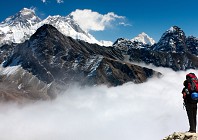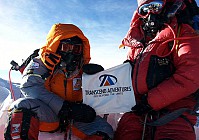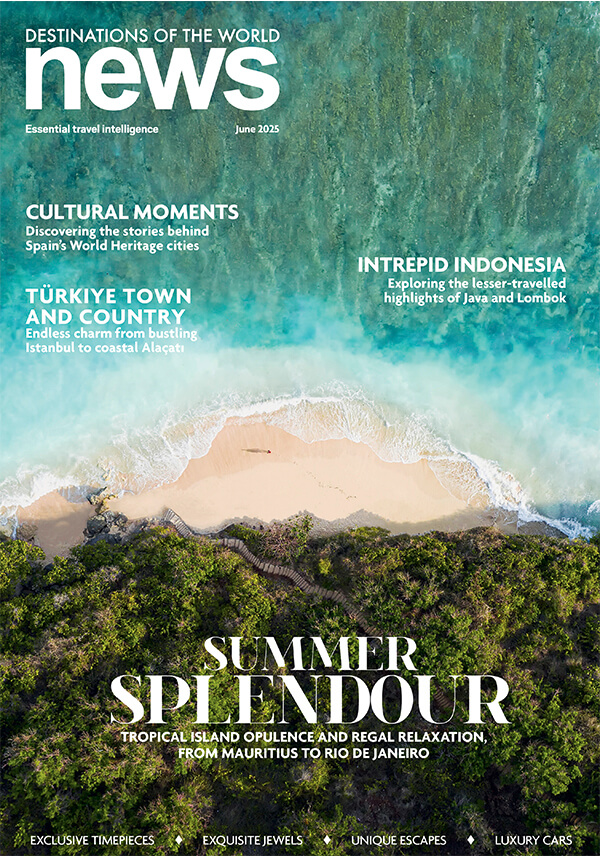|
Five years, ago, as Sheikh Mohammed bin Abdulla Al Thani floated down a river in Nepal on a rafting expedition, an idea was born. The shadow of Mount Everest formed an indelible image on his mind, and he knew he had to climb it. Five years later, he became the first Qatari to summit the world’s highest mountain, when he and his climbing team, Arabs with Altitude, reached the top of the peak on May 22, a month before his 31st birthday. |
Also in the team were his friends, Masoud Mohammad and Raed Zidan, as well as 27-year-old Raha Moharrak, the first Saudi Arabian woman to climb the mountain. Together they were raising funds for the charity Reach Out To Asia (ROTA), a Qatar-based charity that supports educational projects in Asia.
When he is not climbing mountains, Sheikh Mohammed is the director general of Sharjah Statistics Centre, the managing director of Sharjah Golf & Shooting Club, the founder of Musafir.com and a member of the Board of Directors at Sharjah-based Air Arabia. We caught up with him 10 days after he reached the summit, to find out what drove him to the highest point on the planet.
Tell us about your recent adventure — how did it all begin?
My recent adventure was to the highest point on Earth – Mount Everest. It started when I went river rafting in Nepal five years ago. We had a guide who told us everything about Nepal – he told us about the culture, the community and the political instability. It was just after the overthrow of the King, so he was talking a lot about that. Then he started talking about Everest. Every time he talked about Everest, I wanted to know more about it. I told him I wanted to climb that mountain and he told me, “You can’t climb it – you are from the desert. What do you know about climbing mountains?”
Did you see that guide again?
Yes, I invited him to our hotel after we came down from the mountain. We were in a press conference in Kathmandu and he was sitting there. I said, “Five years ago there was a guy who told me I can’t climb Everest and this guy is sitting in the room today. I just wanted to tell him that I climbed it and I want to thank him for telling me I couldn’t do it.” Then I added, “Please, don’t tell me I can’t do anything else!”
What was going through your head when you reached the summit?
For some reason I got very energised at the end. I was standing there and I was really happy. Usually I tear up or cry, but for some reason on this summit I didn’t – I was just thanking God. I was standing there looking at the prayer flags on the summit and I couldn’t believe that I was there. It was like winning my gold medal and standing on the podium. You can’t explain the feeling. It’s pride, it’s joy, it’s happiness – it is everything at the same time.
What was the worst moment?
The scariest moment was when we experienced an icefall right next to us. I was crossing a ladder over a ravine. As I was on my last step the whole mountain next to us collapsed. A whole iceberg three floors high just turned into snow. We started running but we were roped up and there was another ladder in front of us. I thought that everything was going to go. Luckily it stopped just next to us. That was terrifying.
Were there other Arab climbing teams on the mountain?
We were the first ever Arab team. We were really famous on the mountain; everyone knew us. There was also a Moroccan guy who was the first Moroccan to summit.
What luxury item did you take with you to the summit?
A flag. The flag was the most important thing on the mountain for me. When I got back I realised I had forgotten it at Camp 2 with my stuff. We left some of our stuff for the sherpas to bring down and I had left it up there. Every day I was calling them and they said “Don’t worry, you will get your bags,” and I said, “I don’t care about the bags, I just want the flag.”
Many senior executives manage a busy work life and still find the time and energy to do things like this — how and why do you do it?
For me it is very peaceful, and I’m sure it is the same for others as well. When I climb, I am only focusing on one thing and that is reaching the top. You forget about everything else. You never have a clearer mind than when you summit a mountain. All you have been thinking about up until that point is the mountain, and then the mountain goes away, so your mind is empty.
You think of your family a lot. You prioritise your life and when you come back home, you know exactly what is important to you. But that fades off and after four or five months, I go back to my old habits and I think to myself, “let’s do another mountain.” So I go and do another mountain.
After every mountain I have created a new business or made big changes. I set challenges for myself in advance to work towards reaching them. If there is no challenge then it is always “one day...” Nothing has happened yet this time, so watch out.
How do you fit training into your busy work schedule?
I make the training something I do as part of my life, rather than something extra. It is something I wake up and do, like brushing my teeth. My training time is my training time; I don’t put off training for meetings, I put off meetings for training. I learnt this from a good friend of mine, [Indian cricketer] Sachin Tendulkar, my partner in Musafir.com. I had a meeting with him once. It was a very important business meeting but when it got to 5pm, he looked at his watch and said, “Sorry, but I have to go train,” and he stood up and left.
Tell us a bit more about the charity?
I am a brand ambassador for Reach Out To Asia (ROTA), which is a non-profit charity based in Qatar – part of the Qatar Foundation. ROTA believes that education is a right and not a privilege for each individual in the world. They build schools in distressed areas all over Asia. My project was to raise a million dollars as part of our climb, and that is ongoing. That money will go to a fund and the money generated from that fund will go towards a scholarship programme. It will help thousands of kids from Nepal to get out of the slums and do something with their lives. For me, personally, I know that I can give something back. They gave me Everest and I will give them something back in return. It makes me really proud to do that – not just climb their mountain and walk away.
When you are not climbing, what kind of holidays do you take?
I enjoy the beach a lot so I tend to go on beach holidays such as the South of France. We usually charter a yacht every summer. My second option would be Los Angeles. There’s lots to do, especially for the kids. And there is lots of shopping to do. It is very suitable for the whole family and Emirates made it very convenient for us to go there direct. The Mondrian is my favourite hotel in LA. It is one of Philippe Starck’s first hotels in the city.
I don’t consider London travel, because I spend a good two months there every year. I have a house there so it is like home. In the summer it is basically an Arab town!
What are your travel indulgences?
The Black AmEx card. It is extremely useful, especially in the States. It gets you things that are usually impossible to get, like reservations. Once, there was this restaurant we wanted to go to. My brother told me I had to book it three weeks in advance and we were a group of 15 people. I called AmEx and said I want a booking at this restaurant and I need it today. Fifteen minutes later they called back and told me they had booked a private table. Whatever you need in any part of the world: if it is available and cash is not a problem, they will get it for you.
What did you take away from the Mount Everest experience?
I already miss the mountain in some ways. I don’t miss the hard work but I miss the life there. The simple life. There is nothing you worry about – you are on the mountain and the only thing you worry about is whether it is going to be a good day to climb or not. The world is full of politics and wars and everything else that fills your head. Over there, it is just you and the mountain.
Some people tell me I am a dreamer. Well, yes I am, but I also try to make my dreams come true. I don’t wait for them to happen on their own, I work to make them happen. Everest didn’t come easy – I worked really hard to climb this mountain. My dreams were big, but at the same time I worked really hard reaching them.
So, my message to others is: have dreams, work towards reaching them and then realise them. There is nothing in the world that feels better than that.











